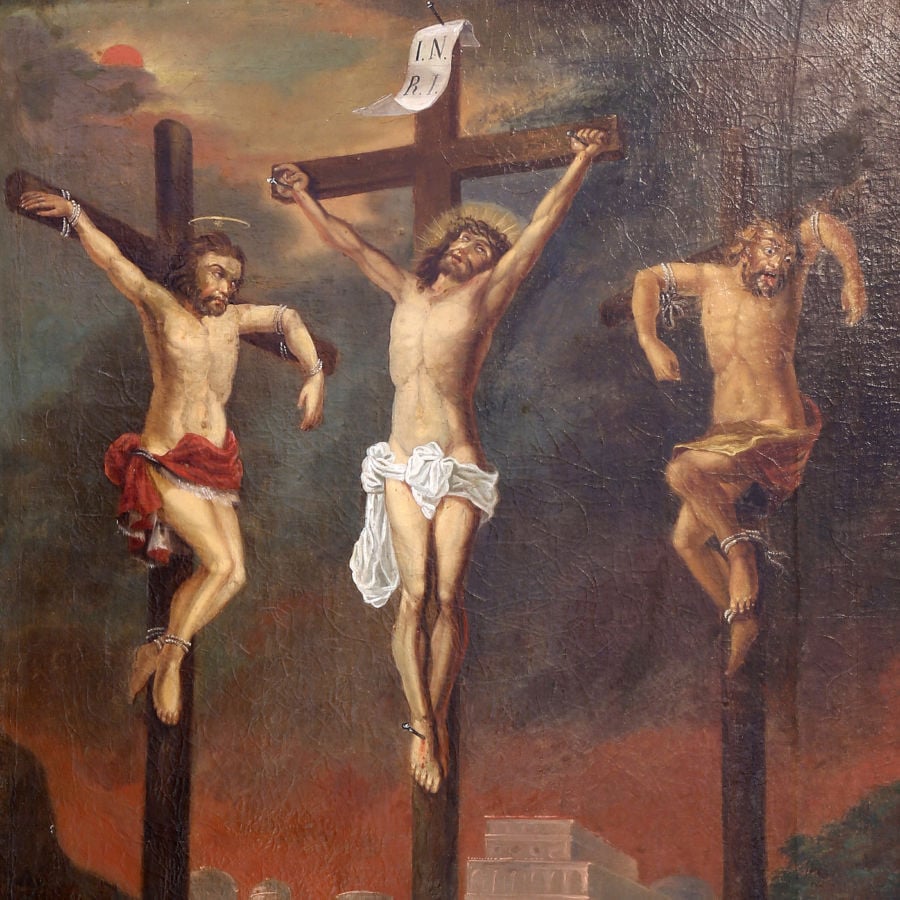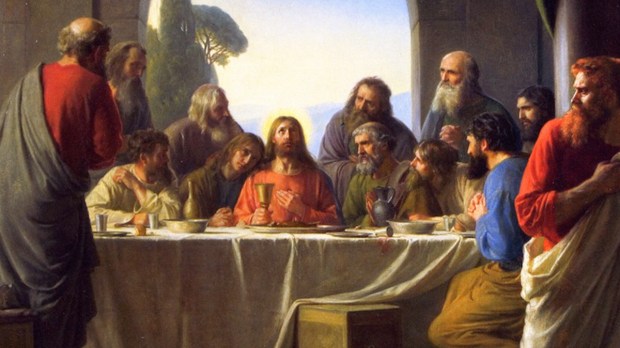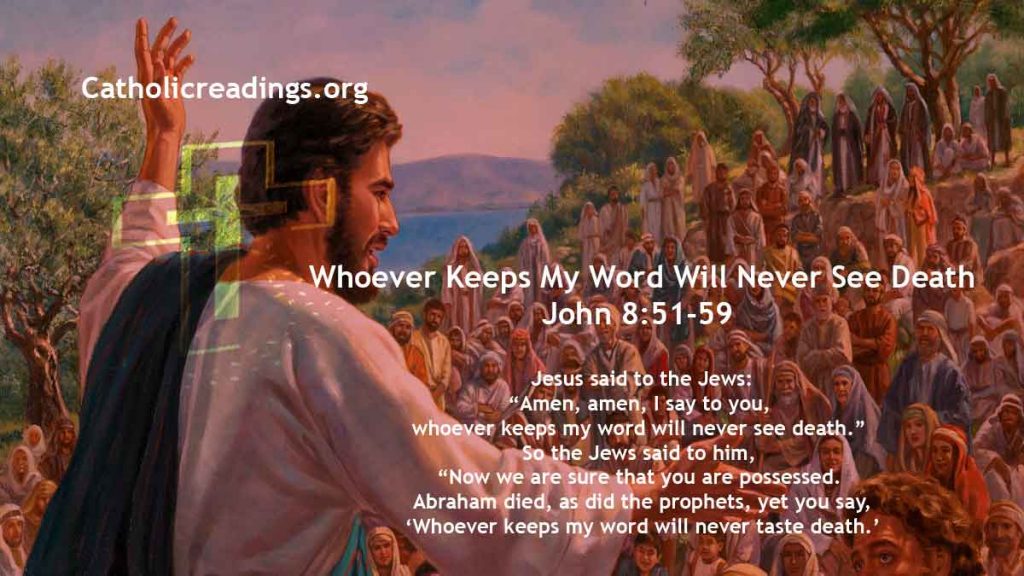
Click Here for: Audio Podcast
Happy Easter! Jesus is Risen! He is Risen Indeed! Today we celebrate the greatest event that ever occurred in the history of the world. By His own power, Jesus rose from the dead. His resurrection gave Him a new body, but He still had the wounds of His crucifixion on it, on His hands feet and side. Our Lord predicted what would happen to Him. He said, “The Son of Man will be handed over and killed, but three days later, He will rise.” By His resurrection, Jesus gave us hope that He is with us today and we can be with Him in heaven.
In the Gospel today, Mary Magdalene went to the tomb, only to discover its empty. She ran to tell the apostles and then Peter and John ran back to the tomb and discover its empty. But they noticed something strange. They saw the cloth that covered His head, not with the burial cloths, but rolled up in a separate place. When John went into the tomb, he saw and believed, yet he and Peter did not understand the Scripture that He had to rise from the dead.
What are the proofs of the resurrection of Jesus today? First, we have the empty tomb. But not just the empty tomb, the cloth that covered the face of Jesus was rolled up in a separate place by itself. How could that be? If someone stole the body, they would not have taken the time to roll up the cloth that covered His face. It was clear Jesus had done it Himself.
You probably heard of the Shroud of Turin, believed to be the burial cloth of Jesus. On the shroud is the image of a crucified man, showing the wounds on His hands, feet and side. It is very detailed. It shows His face, scourge marks and a head that had been crowned with thorns and where is blood had dripped down his face. The shroud is in a Catholic Church in Turin, Italy. It has been examined over the centuries many times by scientists. The shroud even has tiny plant pollen particles that come only from a specific region in Israel.
When the Divine Mercy image was created at the request of St. Faustina, she wanted the artist to create the image of Jesus she saw when He appeared to her in the 1920’s in Poland. But when the image was finished she was deeply disappointed. She said no one could paint an image as beautiful as what she saw. However, just a few years ago, the image of the shroud was transposed over the painting of the Divine Mercy image of Jesus and it is stunning. It was nearly exactly the same. So if we want to see an image of what Jesus looked like we look at that original Divine Mercy painting.
Today, as an Easter gift from myself all including every child will receive a Divine Mercy picture. Its not the exact image St. Faustina had the artist paint, but we receive the same graces any image created as the same representation.
So far we have had examples of proofs Jesus rose from the dead. The empty tomb, the cloth rolled up by itself, the shroud and the Divine Mercy image, an exact image of the shroud. But there are more examples Jesus is risen from the dead.
When we got the new processional cross, I noticed when the cross is placed in the stand, it creates a loud bomb. And so as I was looking at it I made a side comment prayer to Jesus. I said, “What can we do about that?” A few minutes later, I got the idea of getting an o-ring and placing it on the stand. I went to the hardware store and got one and it worked. When I left the church, outside in front of the statue of Jesus and the child Jesus on the ground was the exact size o-ring I had just put on the base of the processional cross. I believe Jesus wanted me to know it was His idea and not mine and that He cares about the smallest little prayers and needs we may have. It is proof that Jesus is risen and is with us.
As you know, I did hospital ministry for four years and one day, I went to non-Catholic patient’s room. The man’s infected foot had an open wound on the top. When I saw his foot, I immediately thought of the wounds on the feet of Jesus and told the man, he was experiencing some pain Jesus felt when He was on the cross. The man said, “Yes, I know, I have thought about that too”. He said, “I am in constant terrible pain, but I know Jesus is with me through it”. He said, “If it wasn’t for Jesus, I could not being going through this.” He said, “Despite everything, I have peace because Jesus is always with me.” The man endures his suffering because he believes Jesus is risen and is with Him. This man’s faith in the resurrected Jesus gave him hope, that no matter his suffering, Our Lord is with him.
Here is another proof Jesus is risen from the dead. My father, was a very good man and like all of us he had a weakness. He was an alcoholic. One day, he decided he wanted to stop drinking. He went to a treatment facility. I was not yet a priest and when he came out of treatment, he told me he had gone to confession. He began to go to AA meetings and discovered he needed God’s help to stay sober. So he turned his life over to God and was sober for many years. He was a changed man. Though he fell a few times, he would just get back up and keep trying. His new life was a witness to the power of the resurrection of Jesus that God dwells in us.
One day, Bishop Fulton Sheen came out of the cathedral and noticed a prostitute near the church doors. He stopped to talk to her and the firs thing she said was, “Don’t ask me to go to Confession, because I will not do that.” This helped the bishop to know she was Catholic. He asked if she could come back the next day and talk to her. She said, “Okay, but I will not go to confession.” He said, “I promise, I will not ask you to go to Confession.” So the next day, she came and as they were walking through the church, he opened the confessional door and gently pushed her inside and closed the door. She said, “You promised, you would not ask me to go to confession.” He said, “I didn’t.” After some talking she went to confession and two years later she joined a Carmelite order. She went from being a prostitute to a bride of Christ. That is proof of the resurrection of Jesus. Our Lord forgave her sins and she lived a new life with Christ.
Due to the fall of Adam and Eve, no one was able to go to heaven. That is, until Jesus suffered, died and rose from the dead. By His death and resurrection, He opened the gates of heaven. And it is through baptism original sin and personal sins are washed away, and we share in God’s divine life.
Once I baptized a baby and after the baptism, the mother kissed the baby’s chest and she said, “I love you, God, I know you are in the heart of my baby.” What a beautiful witness to the resurrection of Jesus.
There is a movie and a book called “Heaven is for Real”. Its a true story about Colton Burpo who shared the story of how he left his body during an emergency surgery and went to heaven. Colton began describing events and people that seemed impossible for him to know about. Examples include knowledge of an unborn sister miscarried by his mother in 1998 and details of a great-grandfather who had died 30 years before Colton was born. Colton also explained how he met Jesus riding a rainbow-colored horse and sat in Jesus' lap while angels sang songs to him. He also saw the Virgin Mary kneeling before the throne of God and at other times standing beside Jesus. This 3 yr old boy gives testimony to the resurrection of Our Lord.
One day, after I visited some Catholics in a nursing home, I had the opportunity of baptizing 90 year old non-Catholic lady. She was unconscious and dying. Her daughter said she has never been baptized but had always wanted it. When she was baptized not only were her sins forgiven, but the punishment due to her sins forgiven. She got a straight shot to heaven. By an inspiration, the risen Jesus directed me to her room and through my hands and with Holy Water, Jesus baptized her to prepare her for heaven and when she arrived she saw the face of Jesus for the first time. Oh the infinite mercy of God.
Bernard Nathanson was a Jewish abortionist, who became Catholic. He was responsible for killing 75,000 babies, but God in His infinite mercy, washed away all of his sins and the punishment due to his sins, when he was baptized. If he would have died immediately after his baptism, he would have went straight to heaven. Here a Jewish man came to believe Jesus died and rose from the dead and was baptized because of it.
I have heard thousands of confessions over the years. Once I heard the confession of a woman, who had not been to confession in 80 yrs. She also received Anointing of the Sick and the Apostolic Pardon because she was very ill in the hospital. All of her sins and the punishment due to her sins were washed away in the ocean of God’s mercy. She believed Jesus rose from the dead and forgave her sins and prepared her for heaven.
You may remember Fr. Colin Boor. Years ago, he did ministry here at Holy Trinity. He is noted for many stories, especially this one.
One day, he went to visit a man in the hospital, and asked if he could anoint him, hear his confession and give him Holy Communion. The man had been a non-practicing Catholic for many years. But, he refused. Because the man was going to die, Fr. Boor came back to his room everyday but the man kept refusing and even told him, “Get out of my room. I don’t want no priest here.” The last time Fr. Boor visited him, the man said, “I don’t want confession. I don’t want you in my room. Get out!” Fr. Boor grabbed a chair and sat down. The man said, “What are you doing?” And Fr. Boor said, “I want to see a man go to hell, I never saw one do that before”. The man’s heart was moved and he went to confession, was anointed, received Holy Communion and the Apostolic Pardon before he died.
Every time we come to Mass, we are witnesses to the resurrection. Our faith is proof Jesus rose from the dead. If we did not believe in the resurrection, we would not be here. We are told and it is true, the bread and wine are changed into the body and blood of Jesus. But the Eucharist is not just the body and blood of Jesus, its the risen and resurrected Lord. Jesus risen from the dead-- in all His glory-- comes down upon the altar and then comes inside of us in Holy Communion. We have a personal and intimate union with Jesus that saints say lasts at least 10 to 15 minutes. What joy it is to receive the living beating Heart of Jesus in the Eucharist and to have His Heart united to our heart. What joy it is to adore Him and speak to Him one on one during our Eucharistic Adoration Holy Hour. For truly, He is there.
If we look for proof Jesus rose from the dead, we have no greater proof, than the Eucharist.
Today, let us look forward to our time with Jesus in Holy Communion, our time with Him in Adoration, our time with Him in our personal prayer knowing He is inside us through baptism. And let us look forward to the day when we too will receive a new resurrected body at the end of the world. As Our Lord said, “He who eats my flesh and drinks my blood, lives in me and I in him, and I will raise him up on the last day.”
My friends, next Sunday is Divine Mercy Sunday. On that day the flood gates of God’s mercy are open. If we have gone to Confession and receive Holy Communion on Divine Mercy Sunday, not only are all our sins forgiven, but the punishment due to our sins forgiven as well. Our soul becomes like it was at baptism. All is washed away in the ocean of God’s mercy. Its only once a year. If you haven’t gone to Confession during Lent, do it before Mass next Sunday and when you receive Holy Communion you will be thrilled and your heart will leap with joy and you will exclaim “Jesus is Risen. He is risen indeed. Alleluia!”














